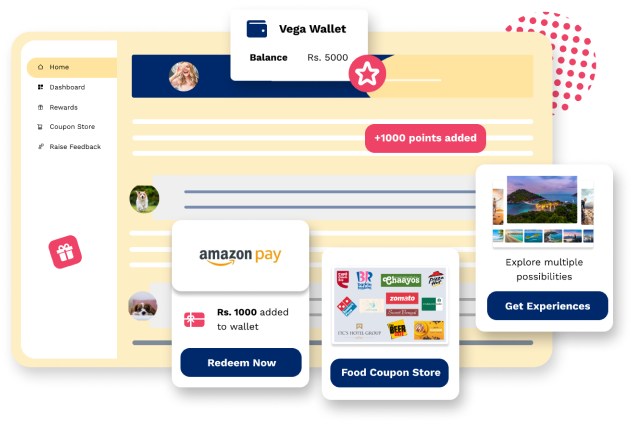Introduction
"Investing in talent management is investing in the future of your organization. It's the catalyst for sustainable growth and innovation." - Mark Johnson
Have you dedicated much time to contemplating your company's talent management? Perhaps less than the duration it took you to read that sentence. The task of attracting and retaining skilled employees has always posed challenges, but these were amplified when the pandemic emerged. The arrival of this global crisis revolutionized our work dynamics, emphasizing the need for HR teams to effectively manage in-house, remote, and contractual staff simultaneously. This encompasses various processes such as onboarding, recruitment, development, and compensation management.
Implementing a well-defined talent management process empowers HR teams to streamline the entire employee life cycle. How does it function? In this article, we will walk you through a comprehensive understanding of talent management for enhancing employee engagement and retention.
Talent Management Defined
Talent management is the lifeblood of successful organizations, enabling them to attract and retain exceptional individuals who drive long-term growth and prosperity. It encompasses a myriad of development opportunities and powerful strategies that ignite passion and motivation within teams, propelling them to reach new heights of performance.
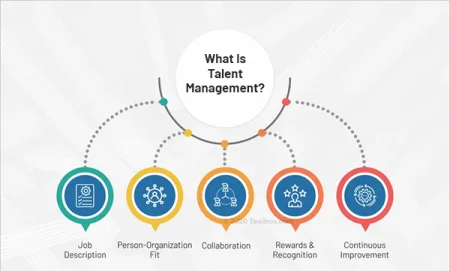
Source: Spiceworks
In the relentless pursuit of excellence, it is crucial to recognize that the cost of replacing a single employee far outweighs the investment required to nurture and retain your existing workforce. Startling statistics from Gallup reveal that the expenses incurred in hiring a new employee can range from a staggering half to double their annual salary. Just imagine the financial impact if your organization, with a hundred dedicated individuals earning $50,000 each, were to face a turnover cost ranging from $660,000 to a jaw-dropping $2.6 million per year.
These figures serve as a resounding wake-up call, urging organizations to prioritize talent retention as a fundamental strategic imperative. By embracing robust talent management practices, you not only safeguard your bottom line but also cultivate a culture of loyalty, engagement, and high performance that sets you apart from the competition.
The Significance of Talent Management
“According to Gallup, companies that effectively implement employee development programs achieve higher levels of employee engagement, resulting in 21% greater profitability. Talent management initiatives, including training and growth opportunities, directly contribute to improved organizational performance.”
In the realm of business, talent management initiatives reign as the driving force behind employee engagement and retention, making them absolutely vital for the enduring triumph of your company. Failing to establish a robust talent management system puts you at risk of fostering a disengaged and uncommitted workforce, compromising their performance and increasing the likelihood of attrition. By harnessing the potential of talent management and driving performance and retention through unwavering employee engagement, you can forge a resilient workforce that is deeply invested in your collective success.
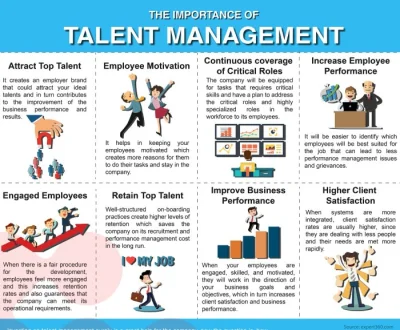
Source: HRM Practice
While the prospect of introducing talent management initiatives aligned with current employee engagement trends may appear daunting and time-intensive, it is an essential undertaking for the sustained growth and triumph of your company. Embracing this critical endeavor empowers you to cultivate an environment where your employees feel motivated, valued, and inspired to contribute their best. It is a strategic investment that pays rich dividends in the form of enhanced productivity, unwavering loyalty, and a thriving organizational culture.
Unlocking Talent Management's Impact on Employee Engagement and Retention
Engaging employees through effective strategies has become an imperative like never before, and talent management serves as the dynamic vehicle that enables companies to achieve this critical goal. A well-crafted talent management initiative is rooted in employee engagement theory and actively cultivates an environment that fosters genuine engagement and long-term retention of both new and existing employees. Without adopting such a holistic approach to employee engagement, your company is bound to face detrimental consequences.
Are You Ready to Supercharge Your Employee Engagement Initiatives?
Explore Vega HRs Comprehensive Suite of Employee Engagement Solutions Designed to Transform Your Workplace to Ensure Success.
Talent management has the power to profoundly impact your efforts in driving engagement and retention across various facets of your organization. By creating a culture that nurtures commitment, talent management contributes to exponential transformations in three key areas: onboarding, performance, and retention.
1 Enhanced Onboarding Experience
By incorporating talent management strategies into your onboarding process, you can actively engage your employees right from their first day. Moving away from mundane desk-bound training and instead offering opportunities to immerse themselves in your company culture fosters a stronger employee-company relationship.
2 Elevated Performance Levels
Implementing talent management strategies to continuously foster employee engagement results in reduced absenteeism and heightened productivity levels. When employees feel genuinely engaged with their work, they naturally strive to contribute to the organization's strategic goals, often going above and beyond their prescribed responsibilities.
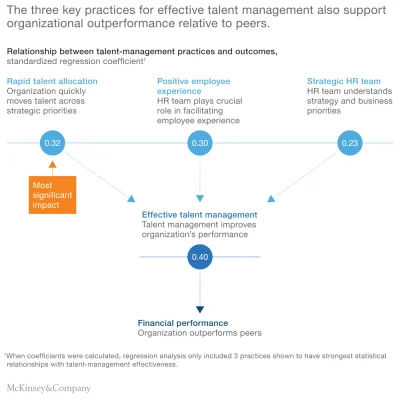
Source: Mckinsey
Implementing effective engagement strategies nurtures a high-performance culture, where employees feel connected to company operations and are dedicated to delivering exceptional work.
3 Reduced Employee Turnover
It is a well-established fact that employees tend to stay with companies where their contributions are valued and appreciated, and where growth opportunities are encouraged. By investing in talent management solutions to effectively manage existing staff and identify new recruits who align with your company culture, you can significantly reduce employee turnover. This cultivates a workforce that is not only deeply committed but also possesses the necessary skills to propel your company forward.
The ability to recognize and nurture existing talent while identifying exceptional new recruits places your employees at the forefront, affirming their crucial role in shaping the company's future. Creating an environment where employees feel valued translates into an unwavering commitment to the long-term success of your company.
Creating a Powerful Talent Management Plan For Employee Engagement and Retention
Creating a powerful talent management plan specifically focused on employee engagement and retention involves a targeted approach. Here are some ways to help you develop an effective plan:
Understand Employee Needs Conduct interviews, surveys, or focus groups to collate feedback from your employees. Understand their needs, aspirations, and areas where they feel their engagement and retention can be improved.
| Foster a Positive Work Culture Create a work environment that promotes a sense of belonging, respect, and camaraderie. Encourage open communication, collaboration, and teamwork. Recognize and celebrate employee achievements and contributions.
|
Provide Growth and Development Opportunities Create a clear career development framework that outlines opportunities for growth, advancement, and skill enhancement. Offer training programs, mentorship, and coaching to help employees develop their skills and reach their complete potential.
| Offer Competitive Compensation and Benefits Ensure that your compensation packages are competitive and aligned with industry standards. Regularly review and benchmark salaries to attract and retain top talent. Additionally, provide a comprehensive benefits package that includes healthcare, retirement plans, and other perks that align with employee needs.
|
Promote Work-Life Balance Encourage a healthy work-life balance by providing flexible work arrangements, like - remote work options, flexible hours, or compressed workweeks. Empower employees to effectively balance their personal and professional responsibilities.
| Recognize and Reward Employees Implement a robust employee recognition program that acknowledges and rewards exceptional performance and contributions. This can include monetary incentives, non-monetary rewards, public recognition, or career advancement opportunities.
|
Improve Communication and Feedback Mechanisms Establish regular channels for communication and feedback. Conduct regular performance evaluations, provide constructive feedback, and encourage workers to share their ideas, concerns, and suggestions. Actively listen and respond to their feedback to demonstrate that their voices are valued.
| Monitor and Measure Employee Engagement and Retention Utilize surveys, pulse checks, and other measurement tools to assess employee engagement levels and track retention rates. Analyze the data to identify trends, areas of improvement, and potential interventions to enhance engagement and retention.
|
Stepwise Talent Management Process
The talent management process within an organization encompasses six key steps: planning, attracting, selecting, developing, retaining, and transitioning. Let's delve into each step in more detail:
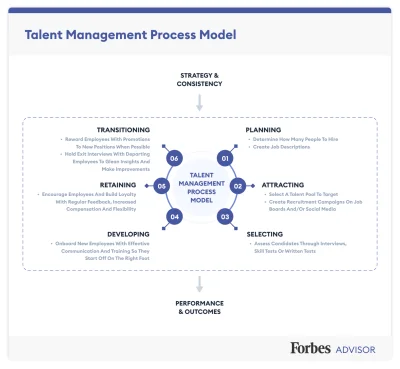
Source: Forbes
Planning: Determine the human capital requirements, identify key roles, and develop a recruitment plan aligned with your business strategy. Consider factors such as skill gaps, future needs, and workforce demographics.
Attracting: Employ various strategies to reach potential candidates. Utilize recruitment campaigns on social media, post job openings on relevant portals, and leverage employee referrals. Consider employing recruiting software to identify and connect with the most suitable candidates for open positions.
Selecting: Implement a comprehensive selection process to identify the best candidates. This may involve conducting interviews, administering written tests, evaluating skills through assessments, and utilizing psychometric tests. Streamline the hiring process, manage candidate information, and facilitate applicant communications with the aid of applicant tracking systems.
Developing: Once employees are hired, ensure a smooth onboarding process to facilitate their integration into the organization. Enhance retention rates by providing growth opportunities such as training sessions, mentorship programs, and peer coaching. Foster an environment conducive to continuous learning and development.
Retaining: Retaining existing talent is vital to avoid the costs associated with frequent turnover. Implement strategies to retain employees, such as offering competitive compensation and benefits, providing growth prospects, actively seeking and incorporating feedback, and offering flexibility in work arrangements.
Transitioning: Acknowledge that employees may leave the organization at some point. Ensure talent departments are invested in the growth and well-being of employees. Conduct exit interviews to gather valuable feedback and insights. Develop succession plans to facilitate a seamless transition and maintain operational continuity. Additionally, recognize and reward long-term employees with retirement benefits and promotions to encourage loyalty and retention.
By following this comprehensive talent management process, organizations can effectively attract, select, develop, retain, and transition their workforce, ensuring sustained success and growth.
Final Thoughts
In conclusion, organizations that prioritize talent management will undoubtedly reap the rewards of increased employee satisfaction, productivity, and retention. So, if your organization is looking for a partner to successfully manage all of these aspects to make the company thrive, then get in touch with us at Vega HR a one-stop solution for all your talent needs. Book a demo today!
About Vega HR
Vega-HR is a powerful tool in the talent war, offering employee rewards, recognition, and pulse recognition. With an engaging platform, it fosters a world-class work culture, providing P2P recognition, social feedback, on-spot recognition, and monetizable incentive solutions with 3000+ coupons in various categories.
Create a Culture People Want to Stick to
- Send rewards
- Give shoutouts
- Build a community
- Gift experiences
Get a demo
 Written by Ali Nasir Kidwai 14 June 2023 | 4 min read
Written by Ali Nasir Kidwai 14 June 2023 | 4 min read




